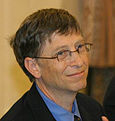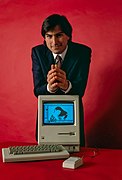The Internet PortalThe Internet (or internet) is the global system of interconnected computer networks that uses the Internet protocol suite (TCP/IP) to communicate between networks and devices. It is a network of networks that consists of private, public, academic, business, and government networks of local to global scope, linked by a broad array of electronic, wireless, and optical networking technologies. The Internet carries a vast range of information resources and services, such as the interlinked hypertext documents and applications of the World Wide Web (WWW), electronic mail, telephony, and file sharing. The origins of the Internet date back to research that enabled the time-sharing of computer resources and the development of packet switching in the 1960s. The set of rules (communication protocols) to enable internetworking on the Internet arose from research and development commissioned in the 1970s by the Defense Advanced Research Projects Agency (DARPA) of the United States Department of Defense in collaboration with universities and researchers across the United States and in the United Kingdom and France. The ARPANET initially served as a backbone for the interconnection of regional academic and military networks in the United States to enable resource sharing. The funding of the National Science Foundation Network as a new backbone in the 1980s, as well as private funding for other commercial extensions, encouraged worldwide participation in the development of new networking technologies and the merger of many networks using DARPA's Internet protocol suite. The linking of commercial networks and enterprises by the early 1990s, as well as the advent of the World Wide Web, marked the beginning of the transition to the modern Internet, and generated sustained exponential growth as generations of institutional, personal, and mobile computers were connected to the network. Although the Internet was widely used by academia in the 1980s, the subsequent commercialization in the 1990s and beyond incorporated its services and technologies into virtually every aspect of modern life. (Full article...) Selected articleDelrina was a Canadian software company based in Toronto, that existed between 1988 and 1995, prior to being bought by the American software firm Symantec. Delrina started out by producing a set of electronic form products known as PerForm and later, FormFlow. However, the company was best known for its WinFax software package of the early- to mid-1990s, which enabled computers equipped with fax-modems to communicate faxes to stand-alone fax machines or other similarly-equipped computers. Delrina also produced a set of popular screensavers, including one that resulted in the well-publicized "flying toasters" lawsuit for copyright and trademark infringement (Berkeley Systems Inc. v. Delrina); the case set a precedent in American law that satiric commercial software products were not subject to the same First Amendment exemptions as parodic cartoons or literature. After the buyout by Symantec in 1995, parts of the firm were sold off, while Symantec continues to sell the WinFax product to this day. In its wake, several of Delrina's former executives founded venture capital firms that continue to have a lasting impact on the Canadian software industry. Selected picture The term Web server can mean one of two things: A computer program that is responsible for accepting HTTP requests from clients, which are known as web browsers, and serving them HTTP responses along with optional data contents, which usually are web pages such as HTML documents and linked objects (images, etc.). A computer that runs a computer program as described above. News
Wikinews Internet portal
WikiProjects
Did you know (auto-generated) -
Selected biography
William Henry Gates III (born 28 October 1955) is an American entrepreneur, software executive, philanthropist and chairman of Microsoft, the software company he founded with Paul Allen. During his career at Microsoft he has held the positions of CEO and chief software architect, and he remains the largest individual shareholder with more than 9% of the common stock. Gates is one of the best-known entrepreneurs of the personal computer revolution. Although he is widely admired, his business tactics have been criticized as anti-competitive and in some instances ruled as such in court. Since amassing his fortune, Gates has pursued a number of philanthropic endeavors, donating large amounts of money to various charitable organizations and scientific research programs through the Bill & Melinda Gates Foundation, established in 2000. The annual Forbes magazine's list of The World's Billionaires has ranked Gates as the richest person in the world from 1995 to 2007, with recent estimates putting his net worth over $56 billion USD. When family wealth is considered, his family ranks second behind the Walton family, heirs of Wal-Mart founder Sam Walton. In July 2007, Fortune magazine reported that the increase in value of Mexican billionaire Carlos Slim's holdings of stock caused him to surpass Bill Gates as the world's richest man.
General images -The following are images from various internet-related articles on Wikipedia.
Selected quoteMore Did you know...
Main topics
Featured contentCategoriesRelated portalsThings you can do
Associated WikimediaThe following Wikimedia Foundation sister projects provide more on this subject:
Wikipedia's portals |



















































